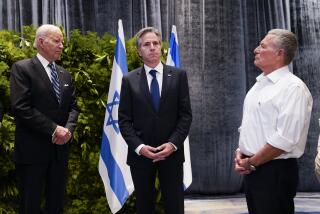U.S. In for a Fight, Administration Warns : White House: Public’s mood swings worry officials. ‘There are going to be ups and downs’ in war, Fitzwater says.
- Share via
WASHINGTON — Worried that the American public’s inflated expections will not be met, the White House stepped up its efforts Thursday to dampen anticipation of a quick victory with few casualties in the Persian Gulf War.
“We have a long way to go yet,” said House Minority Leader Robert H. Michel of Illinois, after Republican congressional leaders met with President Bush, Secretary of State James A. Baker III and Defense Secretary Dick Cheney.
White House officials went out of their way Thursday to try to focus public attention on the need to guard against excessive swings between euphoria and disappointment.
“We need to get on a kind of an even keel in terms of our public psyche that allows us to accept the fact that this is going to last for some period of time,” said Bush’s press secretary, Marlin Fitzwater.
“There are going to be ups and downs; there are going to be enemy victories; there are going to be enemy surprises; there are going to be days when we’ll see allied losses,” Fitzwater said.
“We need to get into a frame of mind that allows us to accept those reverses and surges, but still keep track of the main thrust and our conviction that we will win, that we are being successful at this point, and that in the final analysis we will prevail.”
Because of the way the media is covering the war, Fitzwater said, “We all have a great fear . . . that if (Iraq) shoots down one of our planes, everybody is going to say, ‘Oh, the tide has turned,’ or something like that. I’m just saying, get ready for a longer conflict than just a few days.”
Within days after the bombing of Iraq began on Jan. 17, the Administration began taking steps to counter what it viewed as an unwarranted euphoria that the unprecedented air attack would pummel Iraq into submission without a bloody ground war.
While military officials clearly prefer not to have to engage Hussein’s army on the ground, they fear there is no alternative, although a senior White House official acknowledged that “a grinding ground campaign is the way (Hussein) would like to go.”
At his first news conference after the fighting began, President Bush warned that “there will be losses. There will be obstacles along the way. War is never cheap or easy.”
And, speaking with reporters after completing a trip to three East Coast military bases on Wednesday--a hastily organized trip to boost morale of military families--Vice President Dan Quayle injected a similar note of caution.
“No war is predictable. There is no real certainty in war--except we do know what the outcome of this one is going to be. . . . Clearly, if you get bogged down like Vietnam in a long, protracted campaign against Iraq, public opinion in support of the President will begin to dissipate. There is no doubt about that,” Quayle said. “On the other hand, I think the American people are, perhaps, far more patient that they’re given credit for. They’re patient in achieving victory because they know how important this cause is.”
Although few at the White House want to talk about it, the nation’s experience in Vietnam--and particularly the erosion of support that occurred as the war dragged on--lies at the heart of their concerns.
One questioner asked whether the Administration saw “light at the end of the tunnel,” a phrase often used in the Lyndon B. Johnson Administration’s effort to convince the American public that an end to the war in Southeast Asia was in sight. A senior White House official said nothing, responding only by contorting his face into a forced laugh.
Bush has repeatedly pledged that the gulf conflict will not be another Vietnam. But the fact that both wars were fought in front of television cameras makes some analogies inescapable.
Said one senior Administration official: “Keeping people on an even keel when people see this (war) happening in their living rooms--it’s tough.”
As the Administration focused on maintaining long-term support for the war, Rep. Charles B. Rangel (D-N.Y.), introduced a $6-billion bill to provide a payment of $10,000 to each member of the U.S. armed forces who serves more than 30 days in the gulf.
Rangel said the week-old war has raised a number of unanswered questions in his mind.
“It does shock me that we have been unable to annihilate and wipe out a Third World power,” he said.
Times staff writers David Lauter and William J. Eaton contributed to this report.
More to Read
Get the L.A. Times Politics newsletter
Deeply reported insights into legislation, politics and policy from Sacramento, Washington and beyond. In your inbox twice per week.
You may occasionally receive promotional content from the Los Angeles Times.










